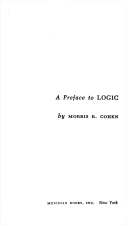The Origin and Evolution of Scientific Terms
It is interesting to note how many fundamental terms which the social sciences are trying to adopt from physics have as a matter of historical fact originated in the social field. Take, for instance, the notion of cause. The Greek aitia or the Latin causa was originally a purely legal term. It was taken over into physics, developed there, and in the 18th century brought back as a foreign-born kind for the adoration of the social sciences. The same is true of the concept of law of nature. Originally a strict anthropomorphic conception, it was gradually depersonalized or dehumanized in the natural sciences and then taken over by the social sciences in an effort to eliminate final causes or purposes from the study of human affairs. It is therefore not anomalous to find similar transformations in the history of such fundamental concepts of statistics as average and probability. The concept of average was developed in the Rhodian laws as to the distribution of losses in maritime risks. After astronomers began to use it in correcting their observations, it spread to other physical sciences; and the prestige which it thus acquired has given it vogue in the social field. The term probability, as its etymology indicates, originates in practical and legal considerations of probing and proving.
Notes:
How terms migrate from science to science, changing their meaning as they go.
Folksonomies: terminology linguistics lexicon
Taxonomies:
/law, govt and politics (0.411741)
/science (0.379169)
/science/mathematics/statistics (0.318860)
Keywords:
social sciences (0.967648 (negative:-0.384279)), strict anthropomorphic conception (0.849511 (negative:-0.504441)), purely legal term (0.825731 (neutral:0.000000)), social field (0.811795 (positive:0.257227)), foreign-born kind (0.587926 (neutral:0.000000)), fundamental terms (0.574342 (positive:0.252570)), historical fact (0.574117 (positive:0.252570)), Scientific Terms (0.568200 (positive:0.225459)), Rhodian laws (0.562076 (negative:-0.549740)), Greek aitia (0.546144 (neutral:0.000000)), Latin causa (0.545566 (neutral:0.000000)), 18th century (0.544280 (neutral:0.000000)), similar transformations (0.532202 (neutral:0.000000)), term probability (0.529297 (neutral:0.000000)), fundamental concepts (0.529205 (neutral:0.000000)), final causes (0.524779 (negative:-0.636850)), human affairs (0.523656 (negative:-0.636850)), natural sciences (0.517933 (negative:-0.636850)), maritime risks (0.514041 (negative:-0.549740)), physical sciences (0.513280 (neutral:0.000000)), legal considerations (0.512396 (positive:0.585216)), physics (0.324511 (positive:0.043506)), instance (0.286402 (negative:-0.301056)), notion (0.283770 (negative:-0.540599)), adoration (0.278020 (neutral:0.000000)), average (0.276174 (neutral:0.000000)), vogue (0.275193 (positive:0.261885)), prestige (0.270354 (positive:0.261885)), etymology (0.270253 (neutral:0.000000)), meaning (0.269101 (neutral:0.000000))
Entities:
physical sciences:FieldTerminology (0.868654 (neutral:0.000000))
Concepts:
Science (0.968877): dbpedia | freebase | opencyc
Social sciences (0.805002): dbpedia | opencyc
Physics (0.794450): dbpedia | freebase | opencyc
Mathematics (0.794349): dbpedia | freebase | opencyc
Nature (0.769966): dbpedia | freebase | opencyc
Natural science (0.757723): dbpedia | freebase
Law (0.608653): dbpedia | freebase | opencyc
Scientific method (0.570170): dbpedia | freebase





